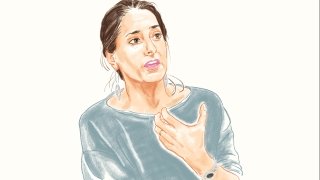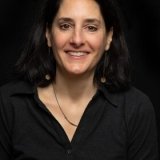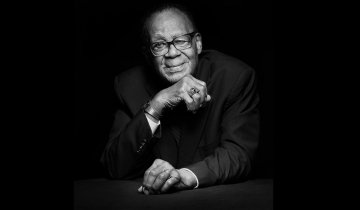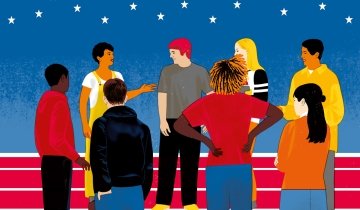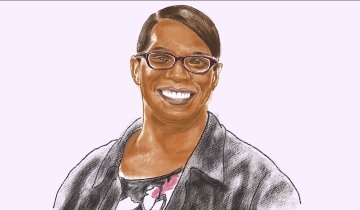The Spring/Summer 2020 issue of USC Rossier Magazine explores the relationship between democracy and education. Why is empathy important in a democracy?
We have some interesting new longitudinal data on adolescents. We can show that there are certain dispositions of mind—propensities toward engaging with social scenarios in ways that facilitate reflection on broader implications, the bigger historical context and values that are at stake—that, in some ways, help you transcend beyond just here and now. What our data suggests is that engaging in these styles of meaning-making grows the brain. The kids who were inclined toward engaging empathically, directly in the world, but then transcending that and making broader kinds of more abstract meaning, that is what actually allowed us to predict their brain development two years later. When kids did this, and also activated their brains in ways that suggested it wasn’t just empty words, then we could predict [they’ll] have better ego integrity, a better sense of values and self-worth, and feel more fulfilled and purposeful as young adults, no matter their IQ.
A democracy is about being able to manage those two ways of making meaning and regulating your behavior. On the one side, you have to be respectful and engage with other people. But that’s not enough to build a democracy or a person. To be a fully actuated and functioning member of democracy means that you can infer the deeper intentions and patterns of beliefs and values that are instantiated in the way we act over time and the broader implications of what’s going on based on our historical past and our hypothetical futures.
“Democracy is about being able to manage ways of making meaning and regulating your behavior.”
Being able to think in that abstract realm—that culturally, socially constructed realm—that’s grounded in broad values like justice and equity. Those kinds of things, you can’t see them looking at the world. Diversity doesn’t equal equity. Equity is an intent. Being able to transcend to build broader meaning seems to be instrumental for adolescent development and well-being, and it’s fundamental to a functioning democracy.
How can educators help foster empathy and this type of abstract thinking?
In a classroom, you need people to be able to get along with each other and regulate themselves. But data has suggested that you need to transcend that. You need to be able to think about the bigger story of what’s happening. And when kids are not set up with opportunities to construct their own beliefs about what’s happening, to reflect on those together, and to reexamine them, elaborate on them and also curtail them when necessary, you get predictable things like, “Why do we have to know this?”
That question should never happen. Kids ought to know why they need to know this, because they are dying to know it, because something they’re working on demands that they must understand it.
What educators need to focus on is deep, interconnected, thoughtful, project-oriented work, where kids are always engaging socially around the work, explaining the work to others [and] reflecting on their process. Those kinds of authentic learning activities, when they’re supported and structured well, produce much higher-level thinking than [what goes] into the tight rubrics and questions.
One of our recent story’s profiles City Heights Prep Charter School, a school run by a Rossier alum with a high population of refugees. Early in your career, you worked in a school with a similar population in Boston. After all your years of research, what advice would you give your younger self and other educators working with these students?
What I would say now to these teachers, and I would say this to any teacher—but it’s so painfully obvious with those refugee kids because they’re so needy, socially and emotionally—is that it’s about supporting them in constructing a narrative out of their own life that makes sense, that’s adaptive and that moves them into a place they want to be. You can’t give people that. The people have to have the agency. If you want them to heal, [you] need to give the kids strategic roles in managing their own schooling experience, their own relationships. Those kinds of opportunities—genuine opportunities to have a voice, to try on their own perspective and get feedback on that, to be free to change and grow into something different—are especially critical for a population like that. They’re critical for all adolescents.
You can’t give somebody a purpose. You need to facilitate them in constructing life.
When kids don’t have adequate opportunities like that, you get what we have right now, which is a 20 percent, on average, rate of high school kids reporting that they regularly think about committing suicide across demographic lines. It’s not because kids are saying, “I’m thinking about dying because I have too much work on my plate, and I just need to escape.” What they’re saying is, “Who am I?” “Who cares?” “Do I really belong here anyway?” “What’s the point of doing this?” “Tell me how Shakespeare lets me have a better adulthood later.” They don’t see the point. They feel empty and purposeless. You can’t give somebody a purpose. You need to facilitate them in constructing life.
You built boats with street children in Russia and studied traditional boatbuilding in Kenya. What attracted you to boatbuilding, and how did this experience shape your work?
That was a long time ago, but it was pretty seminal for my identity. I wanted to explore the world. I wanted to learn languages. I was fascinated with how people build traditions around construction. Traditional ways of teaching and engaging with one another enable people to build things that are amazingly complex, beautiful and functional. Huge boats made out of wood with no power tools!
What attracted me to it was the same sort of thinking that goes into my science now. You collaboratively assess a problem and a space. You have a bunch of constraints that operate on it. You have a certain set of needs that you need to fulfill. And then you figure out, how do I build something that will be beautiful, functional and serve these people well?
How has your experience as a parent shaped your research?
It’s been amazing to see some of the ideas from my research actually play out, to appreciate the nuances and to see for real the things that you think are true—like [that] the agency of the child, the way in which they’re making sense of things, is what’s determining what they’re capable of doing. When you see that in your own kids, it gives you such an amazing respect for and fascination with the human developmental process. My kids have taught me a ton. They’ve become quite reflective on their own development and on my development, too. And, from a practical perspective, they’ve forced me to maintain balance. They will tell me, “I can tell you’re not paying attention to me. Your head’s somewhere else.” So, things that I try to teach them to do, they also remind me of.
The Center for Affective Neuroscience and Developmental Learning in Education (CANDLE) just launched. What are your goals for the center?
CANDLE is a continuation and renaming of activities that I’ve been building up to for years. The new projects will be collaborative, between educators and education scholars like myself, because that’s really where it’s at. We need to build science that informs important questions in education, answers what people need to know and gives new insights into what’s going on, without telling people what to do.
My hope for CANDLE is to launch a new kind of conversation in education about what counts as learning, that shifts the purpose that people understand schools to have in society. I think it will help us to reexamine the big assumptions that undergird modern education and shift to a conversation that’s more centered on development as the desired process and outcome—[understanding] learning as a way to promote development but not as the main outcome of education.
It profoundly changes the way you think about achievement, accountability and assessment. We’ve known for a long time that the best preschool experiences do this. You can’t ignore kids’ social emotional growth, agency and ability to regulate themselves in a preschool environment or the place will fall apart. Older kids are able to compensate for our bad design, basically, except that then they show mental health problems, higher levels of anxiety, depression and boredom, and drop out of school because they’re bored.
If education researchers are only ever talking with one another, it’s hard to see the broad impact their important work might have. What strategies do you use to share your research with people who aren’t well-versed in the highly complex terminology of your field?
I personally spend [a lot of] energy engaging with lay audiences, with teachers, with parents. I’m not telling them what to do. I’m giving them ideas, insights, about how to think about the problem there, and then they can take that and figure out what they should do.
On a broader level, CANDLE will also be engaged both in outreach and in community involvement. So, it’ll be a forum for these kinds of discussions. I can’t talk in details yet, but CANDLE may be part of a network of labs across the U.S. that are engaged in different aspects of the educational reform and research process, so that we can all leverage off one another’s progress and contribute to each other’s conversations and work so that we are greater than the sum of the parts.
CANDLE will be doing the neuroscience research and some direct outreach, but also, if all goes well, we’ll be a wheel with spokes, and CANDLE will be a spoke that’s helping to inform policymaking, assessment innovation and evaluation, innovation in the way teachers are certified and trained, and professional development for in-service teachers, [as well as] changing the way in which we think about many of the fundamental structures in education.
What are your current research projects?
We have several going on. We have the longitudinal project where we followed low-socioeconomic-status kids from immigrant families in L.A. over time.
We’ve got another really exciting innovative project; the first of its kind. We partnered with collaborators at the Bank Street College of Education, and we’re going into urban, public high schools and middle schools that serve low-SEC communities with high proportions of kids of color and highly needy kids, and identifying the most effective teachers there. Then, we’re doing in-depth studies of those teachers’ practices. [Next], we bring them back to the lab and do neuroimaging of all these authentic teaching tasks, like the teachers as they’re grading their real student assignment. We’re trying to characterize, for the first time, the kind of social, emotional and cognitive work and skill it takes to be an effective teacher in these contexts. And then to backpedal from that to say, what would it mean to set teachers up for success in these contexts? What can we learn from these master teachers, about the skills and dispositions of mind and brain and physiological regulation? And how could we support teachers in developing those kinds of dispositions and skills?
We’re trying to characterize, for the first time, the kind of social, emotional and cognitive work and skill it takes to be an effective teacher in these contexts. And then to backpedal from that to say, what would it mean to set teachers up for success in these contexts?
We also are working with the Intellectual Virtues Academies in Long Beach to look at the development of what they call intellectual virtues in adolescents, which is dispositions of mind—values that people bring to the world that represent high-quality, scholarly capacities like intellectual humility, agency, commitment to important ideas, [and] willingness to engage with multiple perspectives around data and evidence.
And then the projects that we’re just now getting funding for are trying to link teachers’ practices together with their students’ brain development. So, are there patterns of teachers’ dispositions, engagement and neural activity that predict their success in engaging students in ways that will grow those students’ brains over time?
You’re incredibly busy. What do you do to relax?
I have a regular yoga practice, which isn’t relaxing—it’s actually super strenuous—but it’s kind of a moving meditation. I like to feel fit and to engage. And it’s a nice community that I’m part of.
I also think just as important as what I do is what I don’t do. I hardly watch TV or movies. I don’t use social media. I’m not saying these things are bad—I just don’t have the bandwidth. I imagine the balance will be different once my kids are grown, but as of right now, it’s them or Facebook.

